Abstract
African Americans are less likely than European Americans to participate in biomedical research. Researchers often attribute nonparticipation to the "Tuskegee effect." Using critical qualitative analysis of focus group data, we examined the public's use of the Tuskegee Study of Untreated Syphilis (TSUS) to discuss biomedical research. Our participants articulated three primary themes in relation to TSUS: 1) that TSUS made them suspicious about biomedical research; 2) that other values had to weigh against concerns about TSUS; and 3) that African Americans could take steps to resolve their concerns about TSUS. African Americans were more likely to discuss TSUS than were European Americans. African Americans did not use TSUS to express simple fear. African Americans suggested issues other than TSUS that influence the decision to participate in research. African Americans indicated specific reforms that would increase participation in research. We discuss how a better understanding of African Americans' use of TSUS can enhance research participation and allay concerns about "another Tuskegee."
Full text
PDF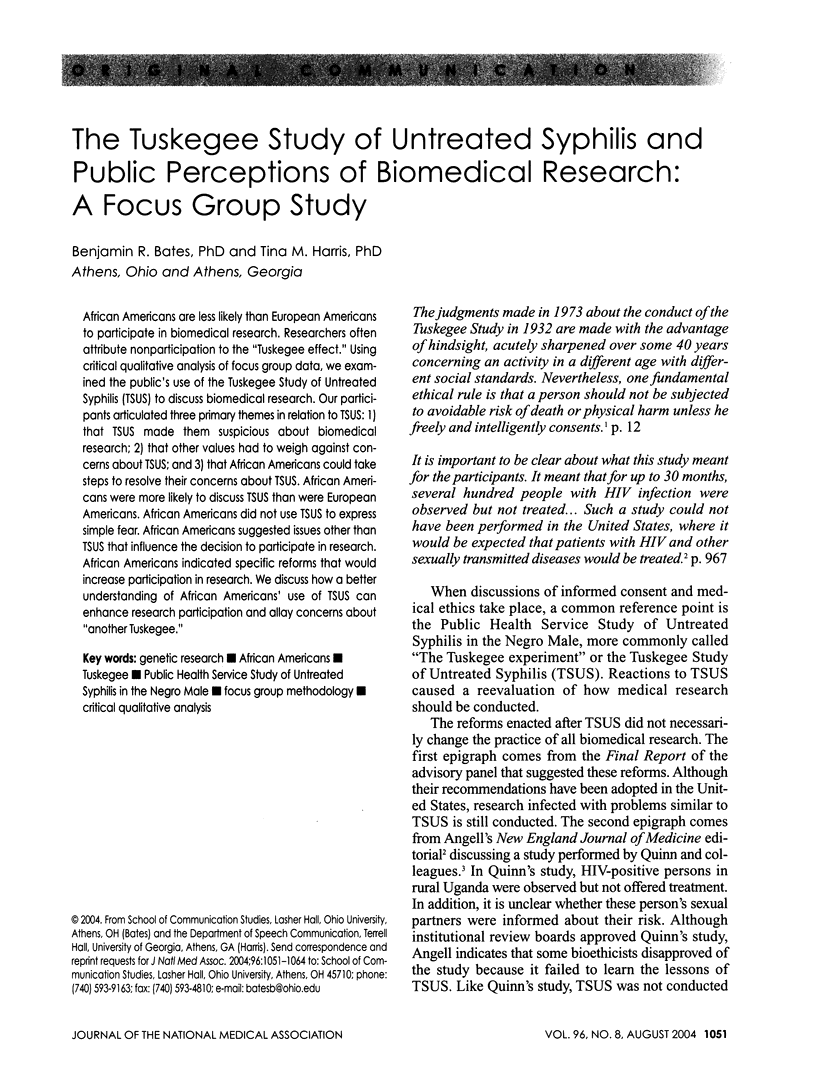


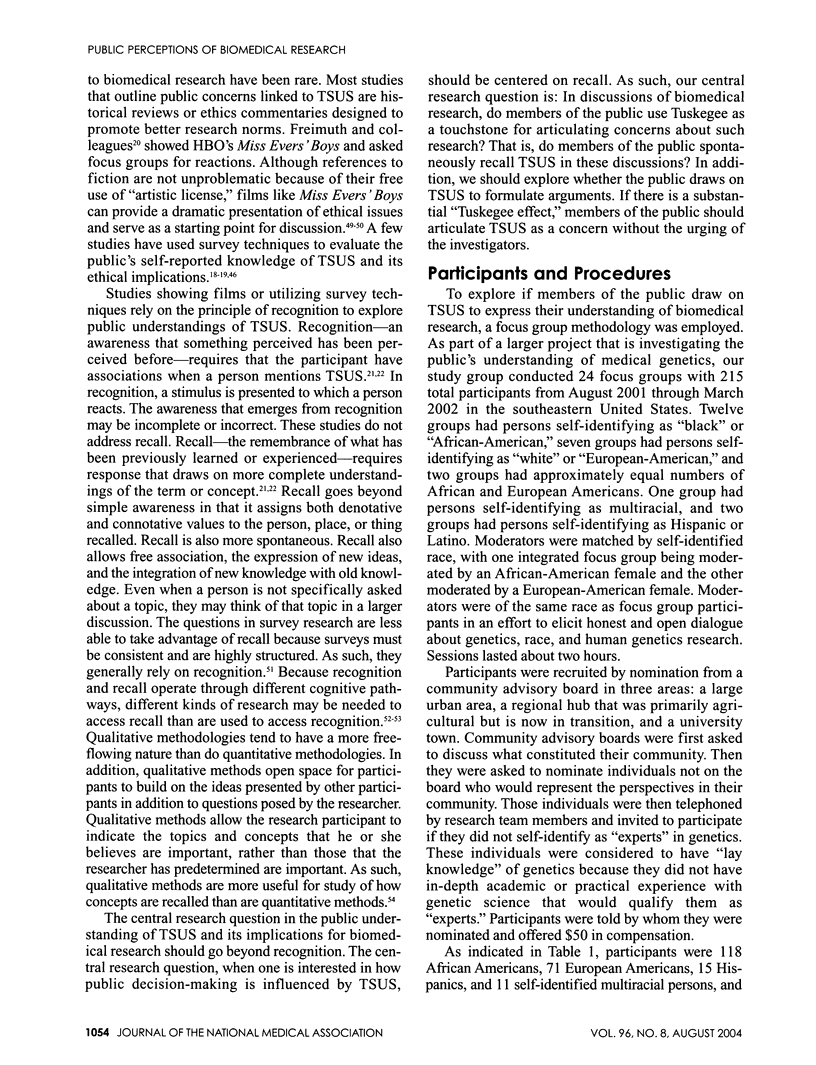

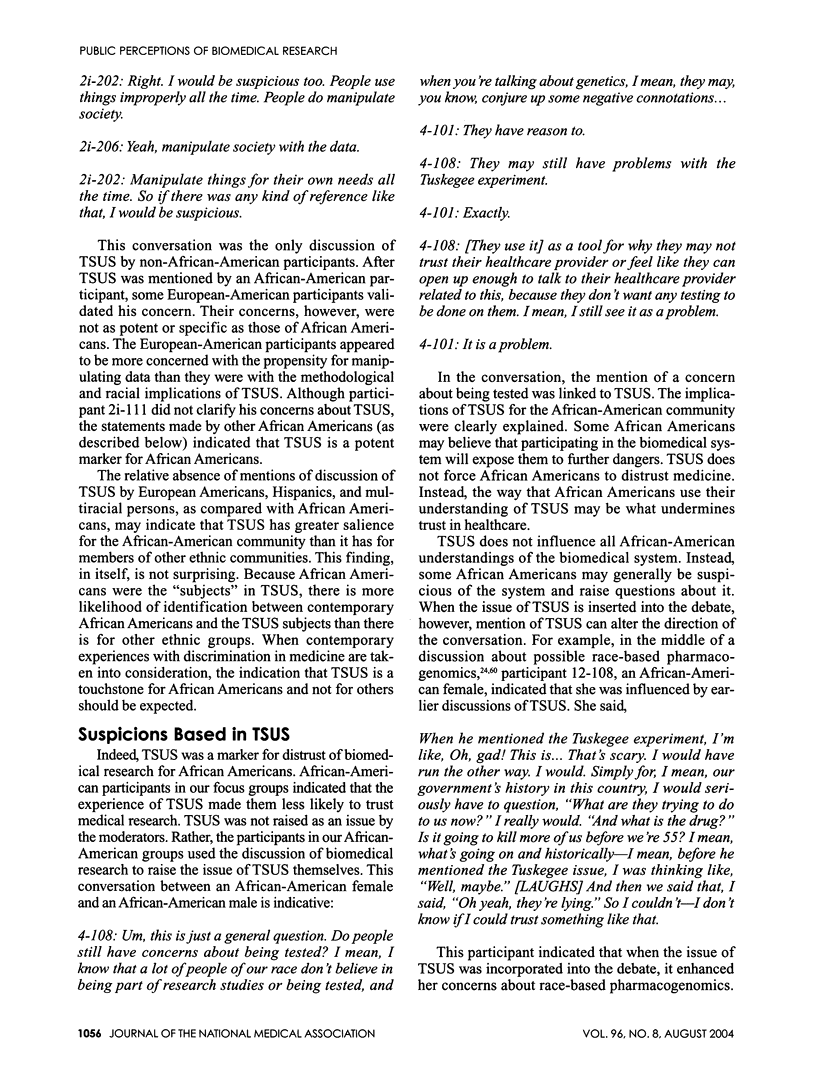
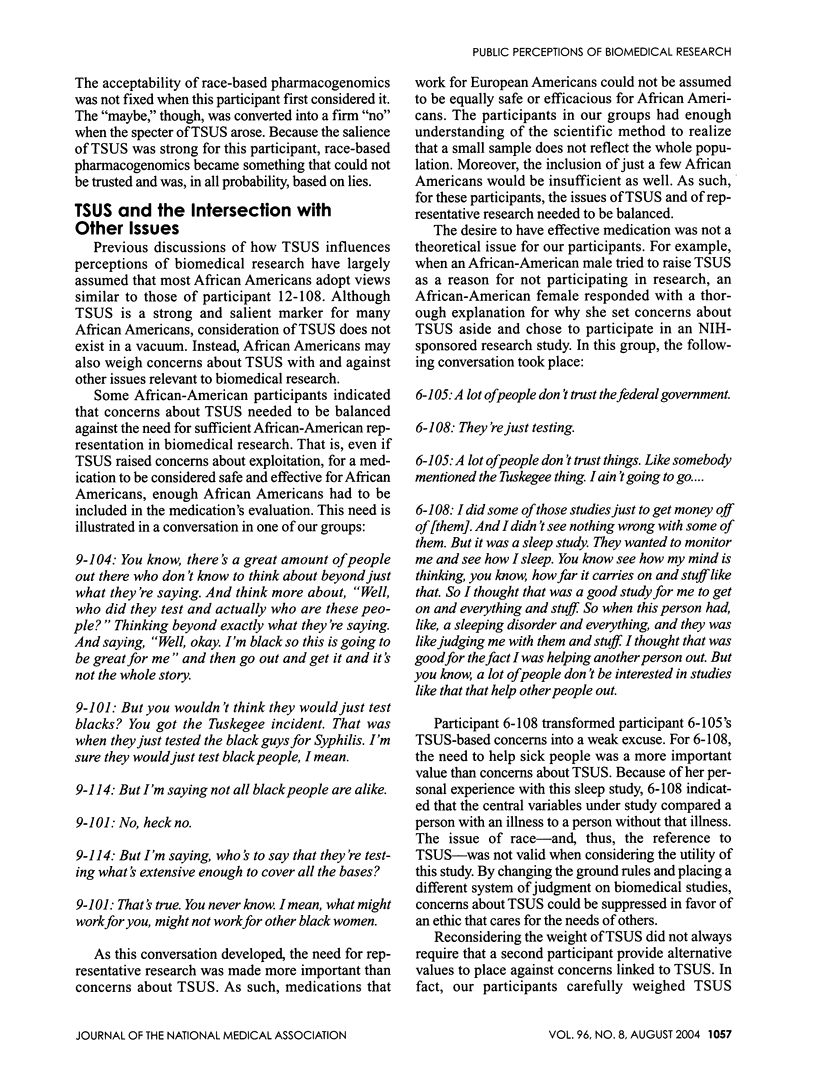
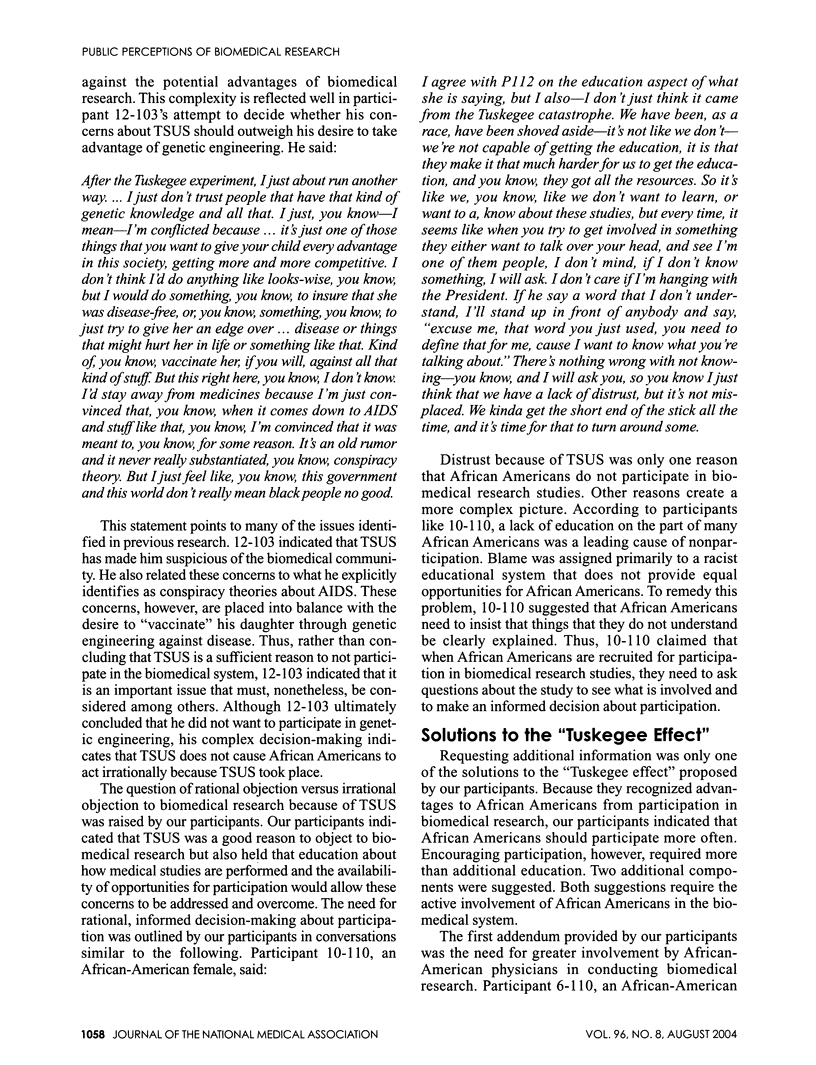
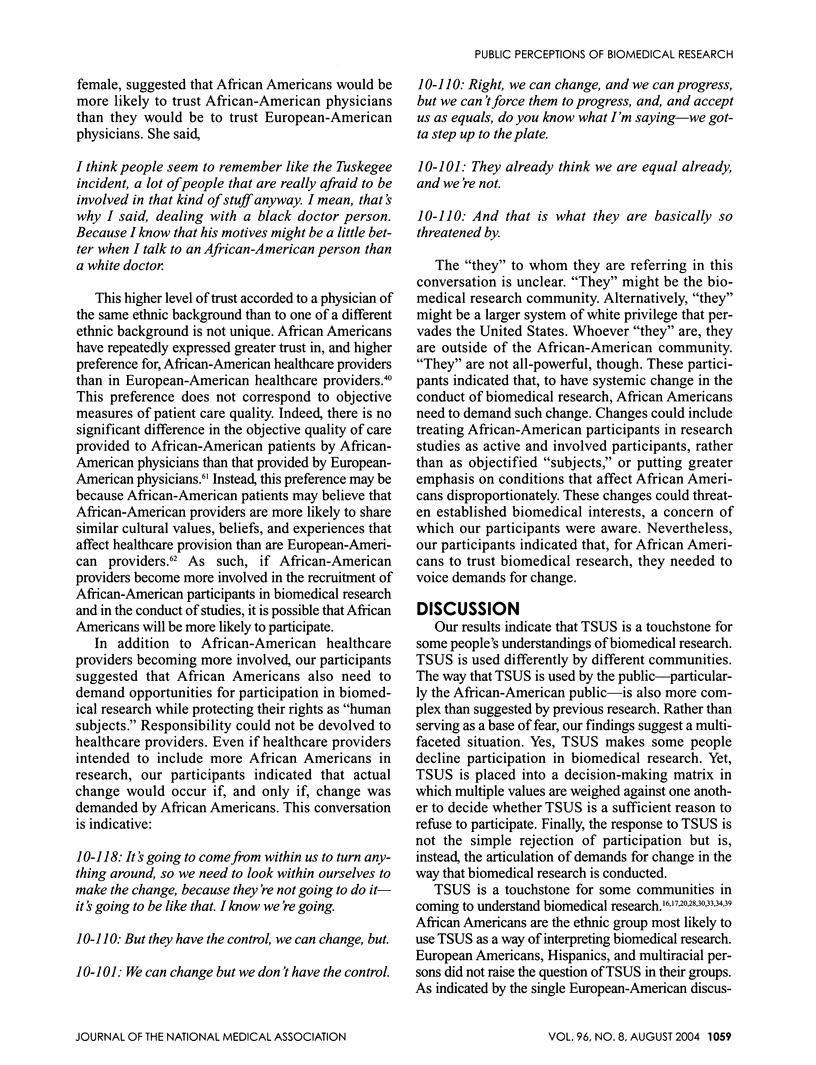

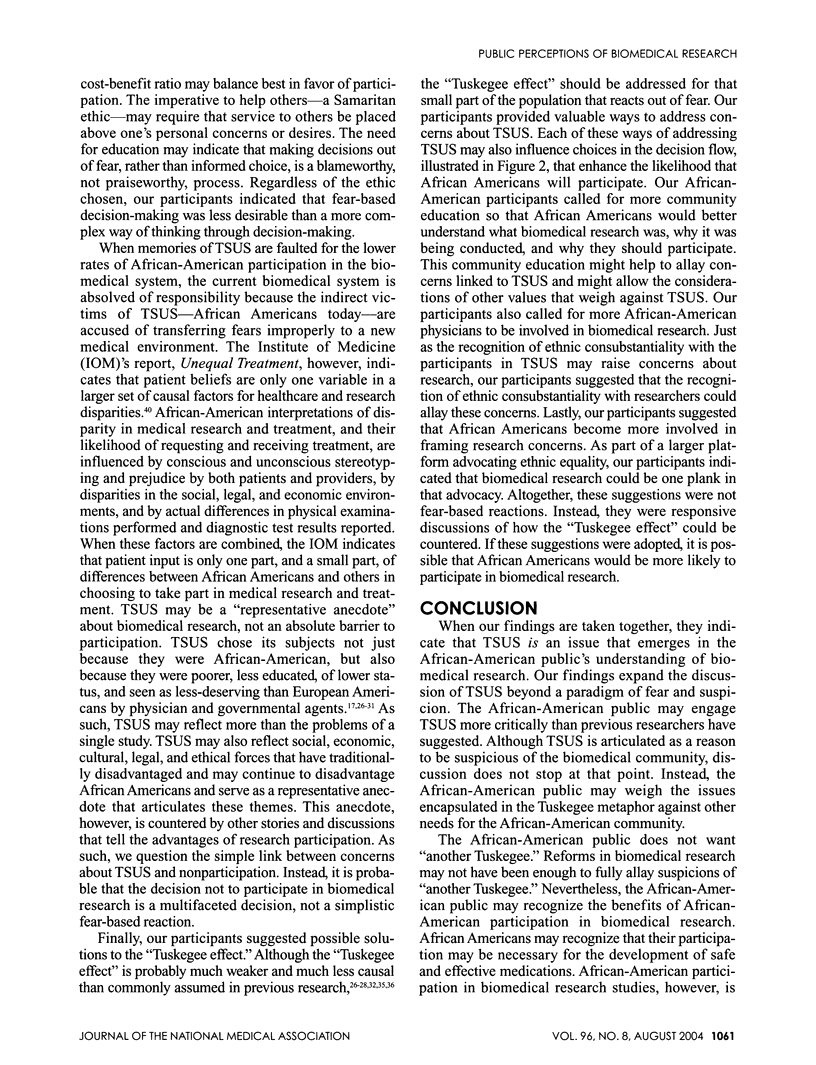


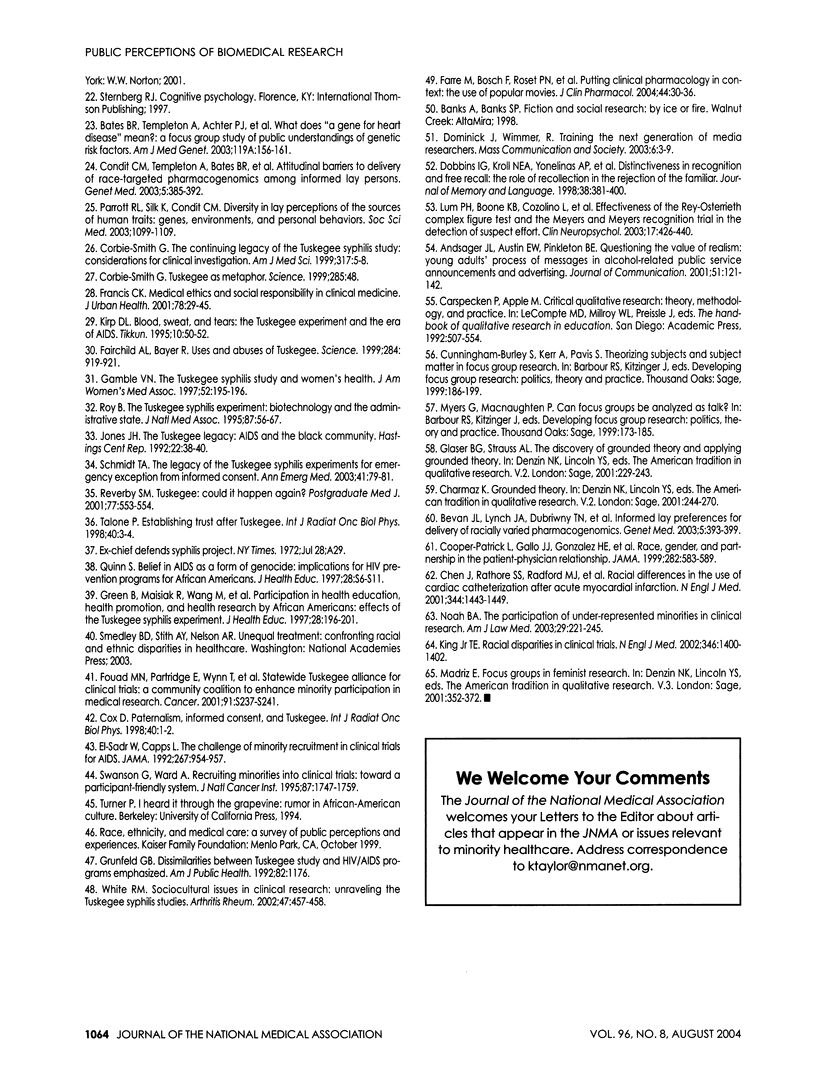
Selected References
These references are in PubMed. This may not be the complete list of references from this article.
- Angell M. Investigators' responsibilities for human subjects in developing countries. N Engl J Med. 2000 Mar 30;342(13):967–969. doi: 10.1056/NEJM200003303421309. [DOI] [PubMed] [Google Scholar]
- Bevan Jennifer L., Lynch Jonh A., Dubriwny Tasha N., Harris Tina M., Achter Paul J., Reeder Amy L., Condit Celeste M. Informed lay preferences for delivery of racially varied pharmacogenomics. Genet Med. 2003 Sep-Oct;5(5):393–399. doi: 10.1097/01.gim.0000087989.12317.3f. [DOI] [PubMed] [Google Scholar]
- Caldwell J. G., Price E. V., Schroeter A. L., Fletcher G. F. Aortic regurgitation in the Tuskegee study of untreated syphilis. J Chronic Dis. 1973 Mar;26(3):187–194. doi: 10.1016/0021-9681(73)90089-1. [DOI] [PubMed] [Google Scholar]
- Caplan A. L., Annas G. J. Tuskegee as metaphor. Science. 1999 Jul 2;285(5424):48–50. [PubMed] [Google Scholar]
- Chen J., Rathore S. S., Radford M. J., Wang Y., Krumholz H. M. Racial differences in the use of cardiac catheterization after acute myocardial infarction. N Engl J Med. 2001 May 10;344(19):1443–1449. doi: 10.1056/NEJM200105103441906. [DOI] [PubMed] [Google Scholar]
- Condit Celeste, Templeton Alan, Bates Benjamin R., Bevan Jennifer L., Harris Tina M. Attitudinal barriers to delivery of race-targeted pharmacogenomics among informed lay persons. Genet Med. 2003 Sep-Oct;5(5):385–392. doi: 10.1097/01.gim.0000087990.30961.72. [DOI] [PubMed] [Google Scholar]
- Cooper-Patrick L., Gallo J. J., Gonzales J. J., Vu H. T., Powe N. R., Nelson C., Ford D. E. Race, gender, and partnership in the patient-physician relationship. JAMA. 1999 Aug 11;282(6):583–589. doi: 10.1001/jama.282.6.583. [DOI] [PubMed] [Google Scholar]
- Corbie-Smith G. The continuing legacy of the Tuskegee Syphilis Study: considerations for clinical investigation. Am J Med Sci. 1999 Jan;317(1):5–8. doi: 10.1097/00000441-199901000-00002. [DOI] [PubMed] [Google Scholar]
- Coughlin S. S., Etheredge G. D., Metayer C., Martin S. A., Jr Remember Tuskegee: public health student knowledge of the ethical significance of the Tuskegee Syphilis Study. Am J Prev Med. 1996 Jul-Aug;12(4):242–246. [PubMed] [Google Scholar]
- Cox J. D. Paternalism, informed consent and Tuskegee. Int J Radiat Oncol Biol Phys. 1998 Jan 1;40(1):1–2. doi: 10.1016/s0360-3016(97)00831-6. [DOI] [PubMed] [Google Scholar]
- Fairchild A. L., Bayer R. Uses and abuses of Tuskegee. Science. 1999 May 7;284(5416):919–921. doi: 10.1126/science.284.5416.919. [DOI] [PubMed] [Google Scholar]
- Farré Magí, Bosch Fèlix, Roset Pere N., Baños Josep-E. Putting clinical pharmacology in context: the use of popular movies. J Clin Pharmacol. 2004 Jan;44(1):30–36. doi: 10.1177/0091270003260679. [DOI] [PubMed] [Google Scholar]
- Francis C. K. Medical ethos and social responsibility in clinical medicine. J Urban Health. 2001 Mar;78(1):29–45. doi: 10.1093/jurban/78.1.29. [DOI] [PMC free article] [PubMed] [Google Scholar]
- Freimuth V. S., Quinn S. C., Thomas S. B., Cole G., Zook E., Duncan T. African Americans' views on research and the Tuskegee Syphilis Study. Soc Sci Med. 2001 Mar;52(5):797–808. doi: 10.1016/s0277-9536(00)00178-7. [DOI] [PubMed] [Google Scholar]
- Gamble V. N. The Tuskegee Syphilis Study and women's health. J Am Med Womens Assoc. 1997 Fall;52(4):195–196. [PubMed] [Google Scholar]
- Gamble V. N. Under the shadow of Tuskegee: African Americans and health care. Am J Public Health. 1997 Nov;87(11):1773–1778. doi: 10.2105/ajph.87.11.1773. [DOI] [PMC free article] [PubMed] [Google Scholar]
- Grunfeld G. B. Dissimilarities between Tuskegee Study and HIV/AIDS programs emphasized. Am J Public Health. 1992 Aug;82(8):1176–1176. doi: 10.2105/ajph.82.8.1176-a. [DOI] [PMC free article] [PubMed] [Google Scholar]
- Jones J. H. The Tuskegee legacy. AIDS and the black community. Hastings Cent Rep. 1992 Nov-Dec;22(6):38–40. [PubMed] [Google Scholar]
- King Talmadge E., Jr Racial disparities in clinical trials. N Engl J Med. 2002 May 2;346(18):1400–1402. doi: 10.1056/NEJM200205023461812. [DOI] [PubMed] [Google Scholar]
- Kirp David L. Blood, sweat, and tears: the Tuskegee experiment and the era of AIDS. Tikkun. 1995 May-Jun;10(3):50–54. [PubMed] [Google Scholar]
- Lu Po H., Boone Kyle Brauer, Cozolino Louis, Mitchell Cary. Effectiveness of the Rey-Osterrieth Complex Figure Test and the Meyers and Meyers recognition trial in the detection of suspect effort. Clin Neuropsychol. 2003 Aug;17(3):426–440. doi: 10.1076/clin.17.3.426.18083. [DOI] [PubMed] [Google Scholar]
- Noah Barbara A. The participation of underrepresented minorities in clinical research. Am J Law Med. 2003;29(2-3):221–245. [PubMed] [Google Scholar]
- OLANSKY S., SCHUMAN S. H., PETERS J. J., SMITH C. A., RAMBO D. S. Untreated syphilis in the male Negro. X. Twenty years of clinical observation of untreated syphilitic and presumably nonsyphilitic groups. J Chronic Dis. 1956 Aug;4(2):177–185. doi: 10.1016/0021-9681(56)90019-4. [DOI] [PubMed] [Google Scholar]
- PETERS J. J., PEERS J. H., OLANSKY S., CUTLER J. C., GLEESON G. A. Untreated syphilis in the male Negro; pathologic findings in syphilitic and nonsyphilitic patients. J Chronic Dis. 1955 Feb;1(2):127–148. doi: 10.1016/0021-9681(55)90204-6. [DOI] [PubMed] [Google Scholar]
- Parrott Roxanne L., Silk Kami J., Condit Celeste. Diversity in lay perceptions of the sources of human traits: genes, environments, and personal behaviors. Soc Sci Med. 2003 Mar;56(5):1099–1109. doi: 10.1016/s0277-9536(02)00106-5. [DOI] [PubMed] [Google Scholar]
- Quinn T. C., Wawer M. J., Sewankambo N., Serwadda D., Li C., Wabwire-Mangen F., Meehan M. O., Lutalo T., Gray R. H. Viral load and heterosexual transmission of human immunodeficiency virus type 1. Rakai Project Study Group. N Engl J Med. 2000 Mar 30;342(13):921–929. doi: 10.1056/NEJM200003303421303. [DOI] [PubMed] [Google Scholar]
- ROCKWELL D. H., YOBS A. R., MOORE M. B., Jr THE TUSKEGEE STUDY OF UNTREATED SYPHILIS; THE 30TH YEAR OF OBSERVATION. Arch Intern Med. 1964 Dec;114:792–798. doi: 10.1001/archinte.1964.03860120104011. [DOI] [PubMed] [Google Scholar]
- Reverby S. M. Tuskegee: could it happen again? Postgrad Med J. 2001 Sep;77(911):553–554. doi: 10.1136/pmj.77.911.553. [DOI] [PMC free article] [PubMed] [Google Scholar]
- Roy B. The Tuskegee Syphilis Experiment: biotechnology and the administrative state. J Natl Med Assoc. 1995 Jan;87(1):56–67. [PMC free article] [PubMed] [Google Scholar]
- SCHUMAN S. H., OLANSKY S., RIVERS E., SMITH C. A., RAMBO D. S. Untreated syphilis in the male negro; background and current status of patients in the Tuskegee study. J Chronic Dis. 1955 Nov;2(5):543–558. doi: 10.1016/0021-9681(55)90153-3. [DOI] [PubMed] [Google Scholar]
- Schmidt Terri A. The legacy of the Tuskegee syphilis experiments for emergency exception from informed consent. Ann Emerg Med. 2003 Jan;41(1):79–81. doi: 10.1067/mem.2003.17. [DOI] [PubMed] [Google Scholar]
- Shavers V. L., Lynch C. F., Burmeister L. F. Knowledge of the Tuskegee study and its impact on the willingness to participate in medical research studies. J Natl Med Assoc. 2000 Dec;92(12):563–572. [PMC free article] [PubMed] [Google Scholar]
- Swanson G. M., Ward A. J. Recruiting minorities into clinical trials: toward a participant-friendly system. J Natl Cancer Inst. 1995 Dec 6;87(23):1747–1759. doi: 10.1093/jnci/87.23.1747. [DOI] [PubMed] [Google Scholar]
- Thomas S. B., Quinn S. C. The Tuskegee Syphilis Study, 1932 to 1972: implications for HIV education and AIDS risk education programs in the black community. Am J Public Health. 1991 Nov;81(11):1498–1505. doi: 10.2105/ajph.81.11.1498. [DOI] [PMC free article] [PubMed] [Google Scholar]
- White R. M. Unraveling the Tuskegee Study of Untreated Syphilis. Arch Intern Med. 2000 Mar 13;160(5):585–598. doi: 10.1001/archinte.160.5.585. [DOI] [PubMed] [Google Scholar]
- White Robert M. Sociocultural issues in clinical research: unraveling the Tuskegee syphilis study. Arthritis Rheum. 2002 Aug;47(4):457–458. doi: 10.1002/art.10516. [DOI] [PubMed] [Google Scholar]
- el-Sadr W., Capps L. The challenge of minority recruitment in clinical trials for AIDS. JAMA. 1992 Feb 19;267(7):954–957. [PubMed] [Google Scholar]


